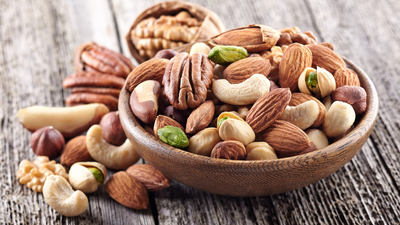Pistachios: This ‘less popular’ nut is among the top sources of Vitamin B complex and only a handful can help meet daily requirement |

This nut was essentially a part of the recovery diet in most Indian homes. Traditionally, it was available raw and unsalted, and a big teaspoon of this nut was given daily to patients who were recovering from weakening ailments. It was probably the ‘home remedy’ or a desi substitute of Vitamin B complex, which is mostly given to patients as a strengthening supplement.That nut is pistachio, popularly called pista. Though almonds and walnuts steal the spotlight, pistachios quietly stand out as one of the richest natural sources of Vitamin B complex and essential nutrients that support energy, metabolism, and nervous system health and has been consumed by people for centuries as per a research published in the NIH. Here’s all we need to know about why this “less-hyped” nut deserves a place in everyday nutrition.
The vitamin B abundance that is hidden in Pista
Pistachios are mostly overlooked when talking about vitamin-rich foods, but few know that they contain almost every key B vitamin in moderate to high amounts. These include B1 (thiamine), B2 (riboflavin), B3 (niacin), B5 (pantothenic acid), B6 (pyridoxine), B9 (folate), and B7 (biotin).Each of these vitamins has a very important role in maintaining the body’s energy balance and nerve health. For example, Vitamin B6 helps in producing neurotransmitters such as serotonin and GABA, which are essential for mental well-being. Meanwhile, thiamine and niacin help convert food into energy, reducing fatigue and improving stamina.Now, what is interesting is that research published in the ResearchGate found that a 28-gram serving (about 49 pistachios) provides nearly 30% of the daily requirement of Vitamin B6, making them one of the richest natural sources available. This means a handful of pistachios can help bridge the nutrient gap that most modern diets miss.
Why Pistachios are more than just a snack
Beyond their vitamin content, pistachios are nutrient-dense yet light, a rare combination. They pack healthy fats, plant-based protein, fibre, and antioxidants, all in a small, crunchy shell.Unlike many other nuts that are calorie-heavy, pistachios are lower in fat and calories while still keeping satiety high. A study by the NIH found that regular consumption of pistachios can support healthy weight management when eaten in moderation, primarily because the fibre and protein in them help maintain fullness longer.Their unique blend of unsaturated fats and amino acids also makes them heart-friendly. These nutrients help reduce LDL (bad cholesterol) and improve HDL (good cholesterol), supporting cardiovascular function. This could be one reason why pistachios are often recommended by dieticians as a smart evening snack over fried foods or biscuits.

The gut-friendly side of Pistachios
Pistachios quietly double up as prebiotic foods, meaning they help feed the good bacteria in the gut. This property sets them apart from many other nuts. Study published in the NIH found that pistachios increase beneficial gut bacteria such as Lactobacillus and Bifidobacterium.A healthy gut, in turn, supports better nutrient absorption, including the very B vitamins pistachios are rich in. This creates a self-sustaining cycle where the nut both provides nutrients and helps the body absorb them efficiently.Those who have grown up in Indian households might remember how a few crushed pistachios were added to milk or desserts for children recovering from fever or digestive issues. That wasn’t just for taste; it was tradition backed by science, as pistachios aid digestion while supplying nutrients that rebuild energy levels.
Pistachios for skin, brain, and hormonal balance
The magic of pistachios extends beyond basic nutrition. Their Vitamin B complex combination, particularly B6 and folate, plays a key role in supporting hormonal balance and brain function.Vitamin B6 helps the body produce hormones like melatonin and serotonin, which regulate mood and sleep. Folate, on the other hand, supports brain cell repair and DNA synthesis. This might explain why regular, moderate consumption of pistachios has been linked to better cognitive performance and reduced risk of mood swings in several observational studies.The high antioxidant content, mainly lutein, zeaxanthin, and polyphenols, protects cells from oxidative stress. This benefit is particularly visible in skin health, as these antioxidants support collagen formation and fight early signs of ageing. The ancient Indian practice of using crushed pista paste in face masks wasn’t merely cosmetic; it was a simple way of feeding the skin essential micronutrients.
The smart way to include Pistachios daily
Modern diet experts suggest a handful of pistachios a day (around 28–30 grams) as a safe and effective portion. The unsalted, unroasted varieties are the healthiest, as they retain maximum Vitamin B content and are free from sodium overload.They can easily fit into daily meals, blended into smoothies, added to yoghurt, or eaten as an afternoon snack. Mixing them with soaked almonds and raisins creates a balanced nutrient mix that boosts energy and helps sustain focus through the day.Those recovering from illness, fatigue, or nutrient deficiencies might find pistachios especially beneficial when combined with milk or whole grains, as this pairing helps in better absorption of the B vitamins.In a time when supplements and fortified foods dominate the wellness market, it’s easy to overlook the simplicity of natural foods like pistachios. But what makes them truly valuable is how they combine tradition with science, offering a naturally balanced profile of vitamins, minerals, and antioxidants that no capsule can replicate.Disclaimer: This article is for informational purposes only and is not a substitute for professional medical advice. Those with nut allergies or specific medical conditions should consult a healthcare professional before making dietary changes.






